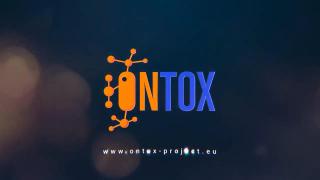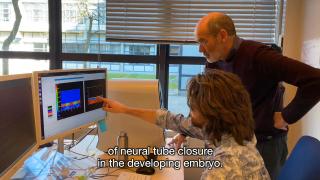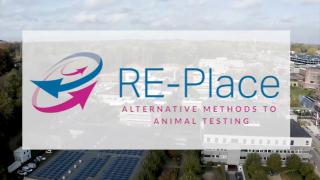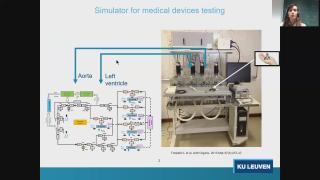In silico

Projects and initiatives
HealthToxicologyIn vitroIn silico
VHP4Safety project
The safety testing of chemicals and pharmaceuticals traditionally relies on animal studies. However, these raise ethical concerns and often fail to accurately predict human responses. New scientific developments offer opportunities to build a Virtual Human Platform (VHP) for safety assessment, a platform that enables assessment based solely on human physiology and biology, integrating data from in vitro and in silico models. This video explains how we are developing the VHP through an interdisciplinary approach. Read the paper in the videolink or visit or VHP4Safety (https://vhp4safety.nl/) for more information.

Innovation examples
HealthToxicologyIn silico
AI agents for safer science: How AI is Changing Chemical Risk Assessment
This video introduces a novel approach to chemical safety, where intelligent digital agents guided by large language models support scientists in making faster, more transparent decisions. By automating complex workflows and integrating tools like the OECD QSAR Toolbox, these agentic systems help prioritise research, reduce reliance on animal testing, and pave the way for safer, more sustainable innovation.

Innovation examples
HealthToxicologyIn silico
Predictive computer models for protein binding
In this video Linde Schoenmaker (Leiden University) explains how she and her colleagues are making computer models to predict the safety of new chemicals within the VHP4Safety project.

Meetings & conferences
HelpathonsHealthToxicologyIn silico
ONTOX Hackathon: Hack To Save Lives And Avoid Animal Suffering
Artificial Intelligence (AI) in toxicology – a potential driver for reducing or replacing laboratory animals in the future. ONTOX project is looking for solutions and innovative ideas to move forward. Are you going to help ONTOX to hack into these complex challenges?
The hackathon will be held from 21 to 23 April 2024 in Utrecht Science Park. The whole event is open to a diverse community of forward-thinkers and problem-solvers interested in the intersection of AI and ethical toxicology. The goal is to bring together passionate individuals who seek innovative solutions to critical challenges in toxicology.
Read more about the hackathon and register here (https://ontox-project.eu/hackathon/).

Innovation examples
HealthInnovationIn silico
Using data and computational modelling in biomedical research
Bioinformatics and systems biology hold great promise to translate the wealth of biological data into meaningful knowledge about human health and disease. The group of Bas Teusink helps biologists to deal with high throughput data, for example metabolomics (how cell metabolism works) and proteomics (how protein networks work) from patient material or cell cultures. This can help to better understand disease mechanisms and aid drug targeting or personalised medicine. In the future, combining data from different models (in vitro, in vivo and human data) could become a digital model of humans, or a “ digital twin”.
Click on the link in the video to watch more or read the interview with Bas (and Jaap Heringa) he[https://vu.nl/en/research/more-about/using-data-and-computational-modelling-in-biomedical-research]re.

Projects and initiatives
HealthToxicologyIn vitroIn silicoOrgan-on-Chip
In3: combining in vitro and in silico for chemical safety assessment
The in3 project aims to drive the synergistic development and utilisation of in vitro and in silico tools for human chemical and nanomaterial safety assessment. The project focused on differentiation of human induced pluripotent stem cells to toxicologically relevant target tissues including; brain, lung, liver and kidney. The tissues, from the same genetic backgrounds, were exposed to common compounds and the data generated and prediction tools generated were used to develop modernised safety assessment approaches combining cheminformatics, mechanistic toxicology and biokinetics into computational models which can account for donor and tissue specific effects.

Innovation examples
HealthToxicologyIn silico
Developing a computational model for human neural tube closure
Animal-free methods for human chemical safety assessment are promising tools for the reduction of animal testing. However, these methods only measure a small aspect of biology compared to an in vivo test. The reductionist nature of these methods thus limits their individual application in the regulatory arena of chemical risk assessment. Ontologies can be used to describe human biology, and delineate the basis of adverse outcome pathway networks that describe how chemical exposures may lead to adverse health effects. This pathway description can then help to select animal-free in vitro and in silico methods, comprehensively covering the network. The comprehensiveness of this approach, firmly rooted in human biology, is expected to facilitate regulatory acceptance of animal-free methods. As an example, this video zooms in on the development of a computational model for neural tube development, an aspect of human development that is especially vulnerable to chemical disruption.
This research is part of the ONTOX project (https://www.ontox-project.eu).
For more information on the concept of the Virtual Human, click here (https://doi.org/10.1016/j.cotox.2019.03.009.).

Projects and initiatives
In vitroIn silico
RE-Place: a database centralising the available expertise on NAMs in Belgium
RE-Place is a scientific project funded by the Flemish and Brussels government which aims to collect all available expertise on the use of alternative methods to animal testing, also known as ‘New Approach Methodologies (NAMs)’ in one central database.
As the development of NAMs is continuously evolving, it can be challenging for (young) scientists to find relevant information on the use thereof. In order to facilitate access to this type of information, the ‘RE-Place’ project was launched. The RE-Place database not only provides a reliable overview of the different NAMs, but also the names of experts and research centres where these techniques can be learned in Belgium. If you are interested to participate in this project, don’t hesitate to contact info@RE-Place.be!
The RE-Place project is coordinated by Sciensano and the Vrije Universiteit Brussel.

Meetings & conferences
HealthIn vitroIn silicoAdvanced
A hybrid in silico-in vitro cardiorespiratory simulator for medical device testing
Cardiovascular medical devices (CMDs) (e.g. artificial hearts, ventricular assist devices, ECMO, heart valves) support the cardiac and/or the respiratory function of patients. Large challenges are encountered when assessing CMDs interaction with the human body and the effects on the heart and vessels. Especially CMDs with new designs require an extensive evaluation concerning their effectiveness and safety under different pathophysiological conditions. We propose a high fidelity cardiorespiratory simulator for the testing of the hemodynamic performance of CMDs. The proposed simulator merges the flexibility of the in silico system with a hydraulic interface to test CMDs. As such, the simulator embeds a high fidelity cardiorespiratory model, allowing the reproduction of pathologies at both cardiac and respiratory level. The simulator works as a test bench for the assessment of CMDs, from prototype stage to pre-clinical stage. Thanks to its flexibility and high-fidelity, the simulator helps reducing animal testing and provides insights on how to improve CMD design to better suit different patient’s needs.
Contact: https://www.kuleuven.be/wieiswie/en/person/00098489
RE-place database: https://www.re-place.be/method/cardiovascular-modelling-medical-device-testing

Expert interviews
In silico
Brett Lidbury, The Australian National University: Using machine learning to predict human health
Brett Lidbury is associate professor at the Research School of Population Health of The Australian National University. He applies machine learning to make predictions about health using human big data rather than animal experiments. For more information, go to www.anu.edu.au and search “Lidbury”.

Expert interviews
ToxicologyIn silicoPolicy
Tox 21: A New Way to Evaluate Chemical Safety and Assess Risk
Tox21 is a US federal research collaboration focused on driving the evolution of Toxicology in the 21st Century by developing methods to rapidly and efficiently evaluate the safety of commercial chemicals, pesticides, food additives/contaminants, and medical products. The goals of Tox21 are to (1) identify mechanisms of chemically-induced biological activity; (2) prioritize chemicals for more extensive testing; and (3) develop more relevant and predictive models of in vivo toxicological responses.